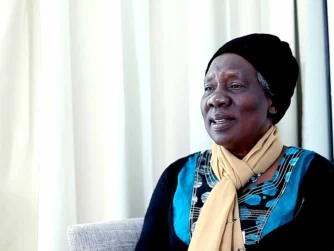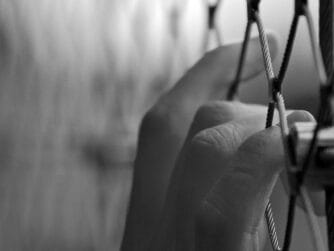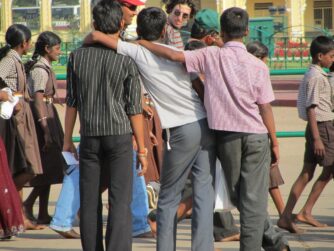Voice 1
Welcome to Spotlight, I’m Patrick Woodward.
Voice 2
And I’m Megan Nollet. Spotlight uses a special English method of broadcasting. It is easier to for people to understand no matter where in the world they live.
Click here to follow along with this program on YouTube.
Voice 1
I am sorry. This phrase is one of the most powerful phrases in the English language. It is something that is often difficult to say. Saying I am sorry means that you regret something you did or said. Saying I am sorry is a kind of apology. It is a way to admit that you were wrong. Today’s Spotlight is on the power of apology.
Voice 2
On the streets of Nalanda, India, a man sits wearing very dirty clothes. His clothes are made from old cloth bags. Old shoes hang around his neck. His name is Shyam Narayan Sharma. He has a dark past. Years ago, he admitted to the murders of sixteen people.
Voice 1
As a young man, Sharma worked as an assassin, a person who kills other people for money. He was fifteen years old when he killed his first person. But this was not his only crime. In 1986 he stole a child. He asked the parents to pay him money – then he would return the child. But after three weeks holding the child, Sharma let the child go. He said he felt sad for the child. The story became famous, but the police never caught him.
Voice 2
Sharma also owned a factory. Like many people in Nalanda, he made guns. Making these guns was illegal, but it made Sharma a lot of money.
Voice 1
But after years of crime, Sharma went to the police. He admitted his crimes. The police put Sharma in prison for a few years. But when he was released, Sharma went back to a life of crime. He went back to the police again in 1995, and finally again in 2000.
Voice 2
During his time in prison, Sharma read many books. These books changed his life. Some of the books were religious books like the Christian Bible. Sharma says that these books changed the way he looked at life. He started teaching other prisoners how to read. He then changed his name to Dayasagar. This new name means “ocean of sadness and caring.”
Voice 1
After four years in prison, he was permitted to leave. But Dayasagar would not leave the prison unless the police promised to keep teaching the other prisoners how to read. The guards had to force Dayasagar to leave the prison.
Voice 2
After prison, Dayasagar sold his home. He used the money to start a school for poor children. He called the school “Nai Subah” which means “New Morning.” Dayasagar teaches sixty children from the village. He does this for free.
Voice 1
At the beginning of this program, we described Dayasgar’s strange clothing – clothes made from cloth bags, with shoes around his neck. His strange clothes are a way for him to recognize his crimes and ask forgiveness. The school and his clothes are a way for Dayasagar to apologize.
Voice 2
Dayasagar apologized for all the bad things that he did. But can a person apologize for things that other people did? Well, in the year 2000 Pope John Paul did just that.
Voice 1
The Catholic Church has existed for more than a thousand years. In this time the church has done many great things. But in his apology, the pope said that the church has also hurt people. Church policy has caused division and suffering. Sometimes, people have died as a result.
Voice 2
So, the pope apologized. He apologized to several special groups including Jews, Gypsies, women, and native people. He apologized for the pain the church caused to people who were not Catholic. He apologized for many historical events.
Voice 1
The pope even apologized to Galileo. Galileo was a scientist in the seventeenth century. He was one of the first people to say that the earth moved around the sun. At this time, the church leaders did not believe this. They thought the sun moved around the earth. So the church put Galileo on trial and sent him to prison. Today, scientists and the church agree that the earth moves around the sun. Pope John Paul wanted to show the world that the church cares about the truth. He wanted to show that any person or group can be wrong sometimes.
Voice 2
Many church leaders were not sure if it was a good idea for the pope to do this. They thought that the church should not admit that it was wrong. They believed that people would not trust them – that it would take away from the church’s authority. But the pope disagreed. He thought that it was important to apologize.
Voice 1
Many doctors agree that apologizing is important. And apologies are good for the giver and receiver. When a person receives an apology, they begin to feel emotional healing. Apologies help people move past anger. When a person does something wrong, they feel bad about it. This feeling can be emotionally damaging. Apologizing helps to heal these emotions. Apologizing shows that you respect the person you wronged. Apologizing also helps keep the person from doing that bad thing again.
Voice 2
Is there something that you have done that you feel bad about? Is there a person who you have treated badly? Do you need to say “I am sorry” to someone? Here are five things you can do to have a successful apology.
Voice 1
One, make your apology real. Mean what you say. People can tell if you take responsibility for what you did or if you are lying.
Voice 2
Two, do not make excuses. An apology is not explaining why you did something, it is saying that you were wrong to do it.
Voice 1
Three, make a promise to change. A real apology shows that you have learned from what you did. Show that you mean what you say.
Voice 2
Four, make it clear that you are apologizing. Just saying “I am sorry” is not enough. Talk about what you did and then say that you feel bad about doing it. It is important that the person knows you are apologizing to them.
Voice 1
Five, be prepared for the unexpected. Sometimes an apology is followed by the other person apologizing. Relationships can be healed. Friendships can be formed. But sometimes an apology does not solve all the problems. It may take time for the person to accept your apology. The person may stay angry with you. You never know how things will end, but an apology can usually help.
Voice 2
Whom do you need to apologize to today?
Voice 1
How have you apologized to those you have hurt? What gives you hope that your apology can change a relationship? What happens if you apologize and the other person does not accept your apology? Tell us what you think. You can leave a comment on our website at www.spotlightenglish.com. You can also find us on YouTube, Facebook, TikTok, Bluesky and X. You can also get our programs delivered directly to your Android or Apple device through our free official Spotlight English app.
Voice 2
The writer of this program was from the Spotlight team. The producer was Michio Ozaki. The voices you heard were from the United Kingdom and the United States. All quotes were adapted for this program and voiced by Spotlight. You can listen to this program again, and read it, on the internet at www.spotlightenglish.com. This program is called, ‘The Power of Apology’.
Voice 1
We hope you can join us again for the next Spotlight program. Goodbye.
Question:
How have you apologized to those you have hurt? What gives you hope that your apology can change a relationship? What happens if you apologize and the other person does not accept your apology?








I am Severino Ramos, I am from Brazil, and I live in São Paulo City.
Dear Spotlight Team, Patrick Woodward, Megan Nollet, and Michio Ozaki
How are things with you?
The Power of Apology
Question 1 – How have you apologized to those you have hurt?
Asking them to accept my apologies. And telling them I am sorry. I promise you that it will never happen again.
Question 2 – What gives you hope that your apology can change a relationship?
I think that it depends on what I have done for the person to change his or her mind to accept my apologies.
We human people are not perfect, but it is better to think carefully before saying or doing something wrong to another, mainly for someone whom we have a special liking and respect for.
Question 3 – What happens if you apologize and the other person does not accept your apology?
I will be very sad about it because I have hurt someone and recognized my guilt, but someone did not accept my apologies.
For that reason, it is essential to think carefully before saying or telling something to another to avoid a broken relationship.
These actions are also important to use at home in the family, such as saying, ‘Dear brother or sister, I am sorry.’ I admit my guilt and I tell you that I promise you that it will never happen again. So, they should embrace each other and forget the bad action or hurt.
Thank you very much for writing that important article.
I appreciate it
Stay with God
Severino Ramos da Silva
Ilove this program
I’ll respect his opinion and leave him.
Hi
Is very powerfull program to ansomone who want to learn
Thank you very much!
I LIKE IT A LOT